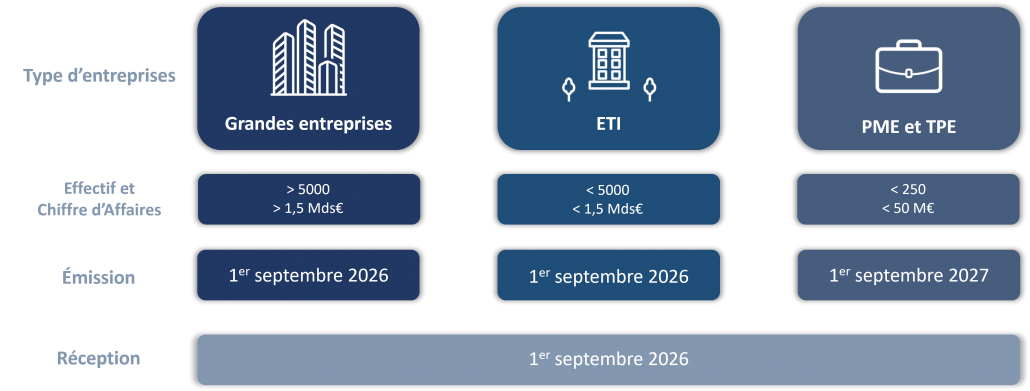Electronic invoicing
Government obligation postponed!
Generalization of electronic invoicing in France
Already implemented since January 1, 2017 for public institutions (via the Chorus Pro public invoicing portal), the generalization of electronic invoicing is being extended to companies subject to VAT, in order tofacilitate their invoicing. Below are the details of the deadlines.
In the wake of the National Assembly's press release of July 28, 2023, announcing the postponement of the generalization of electronic invoicing and the transmission of transaction data (known as ereporting), you will find below the estimated new timetable for entry into force.

The obligation to switch to electronic invoicing is being phased in gradually, depending on the type of business. By 2026, large French companies subject to VAT will be obliged to receive and issue electronic invoices via dematerialization platforms, which may be partners of the administration or directly on the public invoicing portal. Only these platforms will be able to transmit invoices to their recipients, as well as invoice or transaction data (e-reporting: B2C and non-domestic transactions) to the tax authorities.
Electronic invoicing, also called e-invoicing, has four objectives:
- Simplify the life of businesses and strengthen their competitiveness through :
- reducing the administrative burden,
- the reduction of payment times,
- productivity gains resulting from dematerialisation.
- To simplify their VAT reporting obligations in the long term by pre-filling in their returns.
- Improving fraud detection, for the benefit of bona fide economic operators.
- Améto improve real-time knowledge of business activity.
What are the benefits?
Time saving
Accelerate invoice processing: reduce payment times and better manage cash flow
Financial gain
Reduce the costs associated with paper-based invoice processing both at the issuing and settlement stages
Centralization
Benefit from immediate access to invoices, inducing the centralisation of invoices via a one-stop shop
Change management is very important because the advent of electronic invoicing (reform) may worry organisations that do not at first perceive the benefits, especially in the case of small organisations that do not have the resources to lead such a project. However, this reform is a real opportunity to improve productivity and reduce costs. Automating all end-to-end processing, from issuing an invoice to paying it, not to mention simplifying the administrative procedures for declaring VAT, is a real benefit for the company. Like Chorus Pro (B2G), the reform will have a positive impact on payment times and thus give a second wind to cash management.
Our Expertise
With this in mind, and to support its customers in this transformation, BCSolutions has developed eas'Invoiceits own electronic invoicing solution, in compliance with the Chorus Pro (B2G) portal and the future Public Billing Portal linked to the reform.
In order to successfully carry out this project, BCSolutions offers you a complete solution for transforming (Factur-X), signing, archiving and forwarding an invoice in compliance with domestic and cross-border regulations.
The centralisation of your invoicing flows gives you a complete overview of your invoicing. You can fully customise the processing of your invoices according to the tax regulations of the issuing country and the preferences of your customers.
In addition, as a member of the Forum National de la Facturation Electronique et des Marchés Publics Electroniques (FNFE - MPE ), we can keep you fully informed of new regulations.

Electronic invoicing and its challenges
After a period of democratisation of exchanges via messaging systems, dematerialisation became commonplace with standardised formats such as XML or PDF. Then a number of players provided gateway tools and techniques for generating documents from data ( Output Managament, multi-channel communication), then data from documents (OCR, dematerialisation of supplier invoices), enabling automated invoice-order form reconciliations in ERP systems.
The advent of various European (2010) and French (2013) directives aimed at promoting and simplifying the exchange of invoices has only amplified the movement towards tax compliant electronic invoicing.
The aim is to generate a standard invoice document from reliable data from the financial software packages of companies and public entities and to transport it with unquestionable traceability and inalterability. The electronic signature and the probative archiving have been added to complete the audit trail.
The stakes and multiple advantages of dematerialised invoicing are no longer in question. It makes the invoice processing process more fluid, allowing faster payment times, increased operational efficiency, rapid savings for the company and a move towards paperless invoicing.
BCSolutions supports you !
With our expertise and project experience, we can help you set up your project.
From analysis to deployment, we will take care of all phases of your project.
